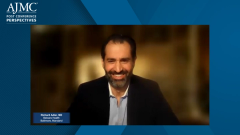
Dual Mechanism Dry Eye Treatment Shows Promise for Symptoms and Compliance
Richard Adler, MD, FACS, provides perspective on AAO 2023 data suggesting dual mechanism treatment targeting aqueous deficiency and meibomian gland dysfunction may improve dry eye symptoms more significantly and faster than singular therapies, benefiting patient compliance and disease management.
Episodes in this series

This is a video synopsis/summary of a Post Conference Perspectives featuring Richard Adler, MD.
Adler discusses additional perspective on results from the SAHARA trial comparing the Aqueous Retention and Meibomian Gland Outflow Restoration (ARMOR) procedure to Restasis (cyclosporine ophthalmic emulsion 0.05%) for dry eye disease. While ARMOR showed superior improvement in tear break-up time, a sign of evaporative dry eye, it did not demonstrate significantly better relief of symptoms compared with Restasis.
However, Adler notes this highlights the complex, multifactorial nature of dry eye requiring multiple treatment modalities to comprehensively address signs and symptoms. As Restasis targets the aqueous deficiency aspect whereas ARMOR specifically treats the evaporative component, using them together could have complementary effects. Though the study premises were not perfectly matched, the results still validate using ARMOR to improve evaporative signs.
Overall, the plethora of new research and innovations presented for dry eye reflects the rapidly expanding therapeutic landscape and opportunities to better treat this condition. Even existing strategies are being improved upon. There remains exciting potential for advancing dry eye management.
Video synopsis is AI-generated and reviewed by AJMC® editorial staff.
Newsletter
Stay ahead of policy, cost, and value—subscribe to AJMC for expert insights at the intersection of clinical care and health economics.










